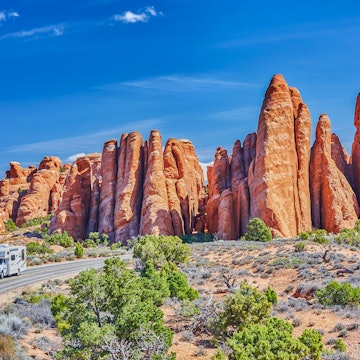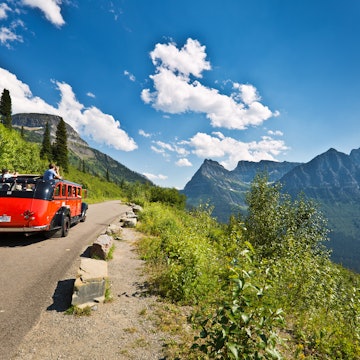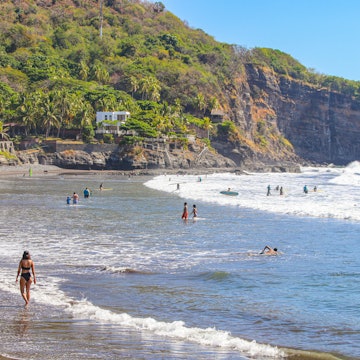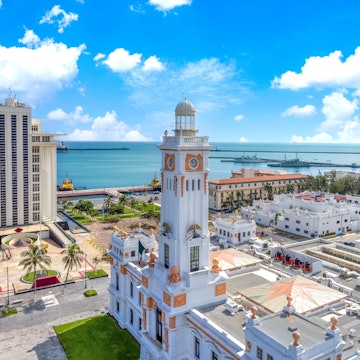

Copper Canyon, Mexico ©jejim/Shutterstock
Mexico boasts more than 65 national parks so any greatest hits list merely scratches the surface of what's on offer. And while the many options may seem overwhelming at first, choosing that ideal spot really just comes down to where your interests lie. So what's your pleasure? An invigorating climb up one of the nation's highest volcanoes? A deep dive into the colorful underwater world of the Mexican Caribbean? Or perhaps a crash course in ancient Maya history among dramatically situated jungle ruins? Here are just some of Mexico's most dazzling national parks.
Editor's note: during COVID-19 there may be additional travel restrictions. Check the latest guidance in Mexico before planning a trip, and always follow local government health advice.
Parque Nacional Izta-Popo Zoquiapan, State of Mexico
Best for climbing a volcano
Imagine the sheer wow-factor of standing before an active 17,800ft (5426m) stratovolcano as it spews columns of smoke and ash hundreds of feet into the air. The sprawling Izta-Popo National Park may not have much in the way of visitor information but it certainly makes up for that with expansive vistas of Mexico's second- and third-highest peaks, the active Popocatépetl and the dormant Iztaccíhuatl (fondly known as El Popo and Izta).
Hiking trails range from easy to hard, depending on how high you want to climb and whether you encounter snow. Ascents up to El Popo are prohibited but you can scale Izta and camp out at a base of the 17,160ft (5230m) volcano. The scenic mountain pass here, known as El Paso de Cortés, was traversed by Spanish conquistador Hernán Cortés and his men in 1519. Best reached by car, Izta-Popo makes a great day trip from Mexico City.

Parque Nacional Arrecifes de Cozumel, Quintana Roo
Best for diving and snorkeling
Considered one of the planet's top dive destinations for its abundant marine life, primo drift diving and cerulean waters with excellent visibility, this Isla Cozumel marine park is a must-visit for scuba and snorkeling enthusiasts. Oh yeah, it also makes up part of the second largest coral reef system in the world. For snorkeling, take a plunge into the crystalline waters of Colombia Shallows or El Cielo, while for divers it's all about experiencing the thrill of Cozumel's renowned wall dives. The Santa Rosa Wall is so large that most people are only able to see a third of it on one tank. The park's boundaries extend across the island's lovely southwest side, where you'll find world-class dive sites inhabited by hawksbill sea turtles, green moray eels, Goliath groupers and giant anemones. Aldora dive shop has friendly and knowledgeable staff.

Parque Nacional Palenque, Chiapas
Best for ancient Maya ruins
Revered for its exquisite Maya architecture set in a misty jungle, Palenque National Park doubles as an important wildlife habitat for scarlet macaws, ocelots and black howler monkeys, whose early-morning roar certainly beats any hotel wake-up call service. The ancient city-state of Palenque flourished in the seventh century and to this day the archaeological site's well-conserved buildings, such as the striking 88ft (27m) Temple of Inscriptions, are a sight to behold as they rise up from the surrounding evergreen forest.
Though the actual town of Palenque is mostly unremarkable, the convivial compound of El Panchán (just off the road to the ruins) offers decent accommodations, restaurants and nightly entertainment on its jungle-covered grounds. While in the Palenque area, consider a side trip to Cascadas Roberto Barrios (about 22 miles south of the archaeological site), where you can swim in turquoise pools backed by sublime waterfalls.

Parque Nacional Bahía de Loreto, Baja California Sur
Best for island-hopping and whale-watching
Sitting pretty in Baja California Sur's Sea of Cortez, one of the most biologically-diverse places on earth, you couldn't ask for a more attractive desert-meets-sea backdrop to enjoy outdoor activities such as diving, kayaking, hiking and camping. Whale-watching (in February and March) is a huge draw at Loreto National Park, as it's regarded as one of the best spots in all of Mexico to see the blue whale, the largest animal on the planet.
Another must-do activity is a boat outing to a group of uninhabited islands and pristine islets, where you can spot sea lions, blue-footed boobies and linger on pristine beaches with turquoise waters. Eco-friendly Loreto Sea and Land Tours operates a range of excursions, from whale-watching and horseback riding to fishing expeditions.

Parque Nacional Huatulco, Oaxaca
Best for beach-bumming
Graced with some 29,000 acres of protected waters and lands, Huatulco National Park is a glorious swath of wildlife-rich jungles, wetlands and pristine bays with sandy beaches hugging a spectacular stretch of Pacific coastline. Playa Cacaluta, a secluded beach that sits on one of five bays within the park's limits, served as a location for the Alfonso Cuarón 2001 road movie Y Tu Mamá También and its undeveloped land hasn't changed a lick in two decades.
Nature buffs will find plenty to do here, from hiking and snorkeling to excellent wildlife-watching opportunities; the park is home to 18 species of whales, dolphins and sea turtles, more than 300 types of birds and 113 acres of coral reefs. And development in the low-rise resort town of Bahías de Huatulco has followed an ecological focus with the park being the main beneficiary of the conservation efforts.

Parque Nacional Cascada de Basaseachi
Best for canyon hiking
You've probably heard of Mexico's astonishing Copper Canyon, a canyon system that's four times larger than the Grand Canyon. Now picture that extraordinary backdrop with a waterfall that drops an impressive 807ft (246m) into swimmable pools. Set in a high-walled canyon deep in the Sierra Madre mountains, the Cascada de Basaseachi is part of a national park of the same name that's known not only for Mexico's highest year-round waterfall but also its extensive off-the-beaten-path trail network. If you simply want to marvel at the falls, it's about a three-hour out-and-back hike from the park entrance. Or explore even more of the stunning Copper Canyon area on an excursion with Creel-based tour outfit 3 Amigos.
You might also like:
What travel looks like in Mexico in 2021
Best time to visit Mexico
April's National Park Week will bring free entry and celebrations
















